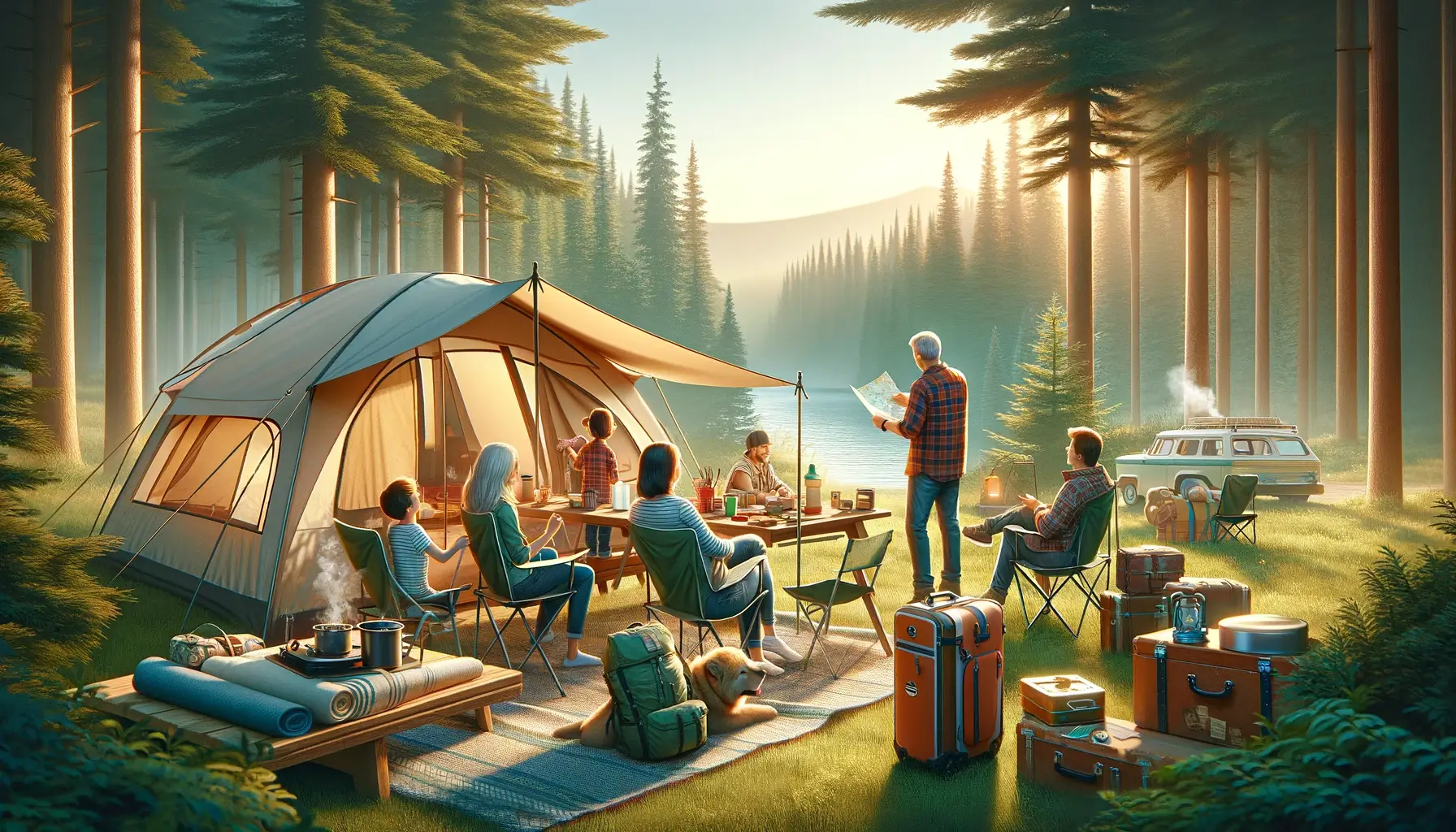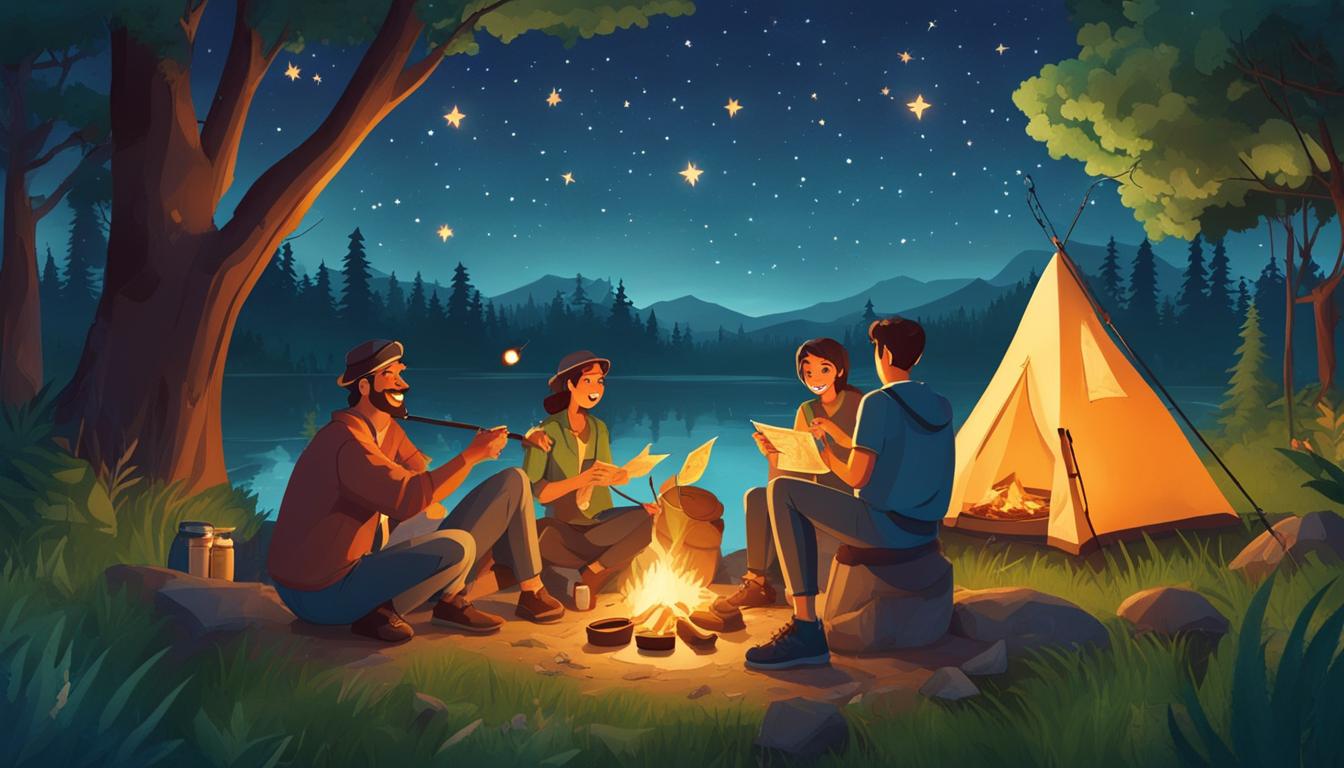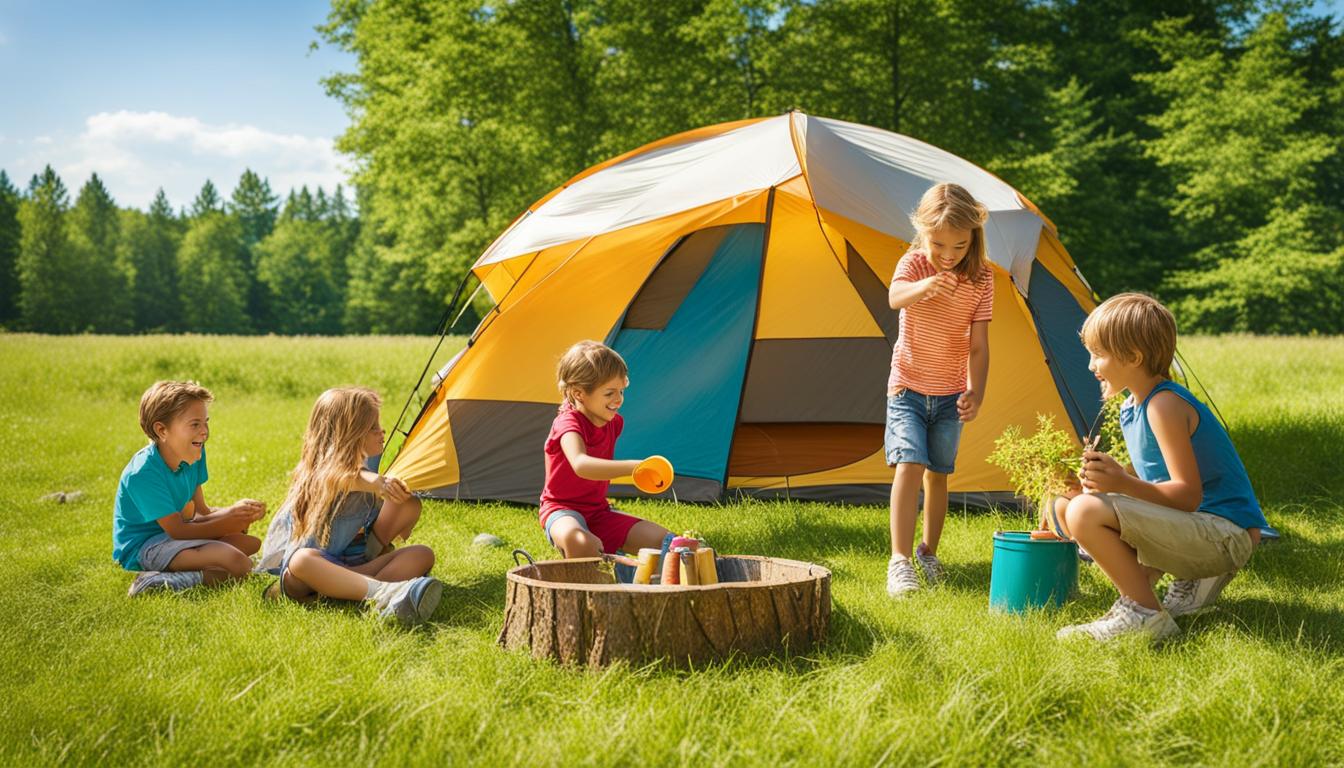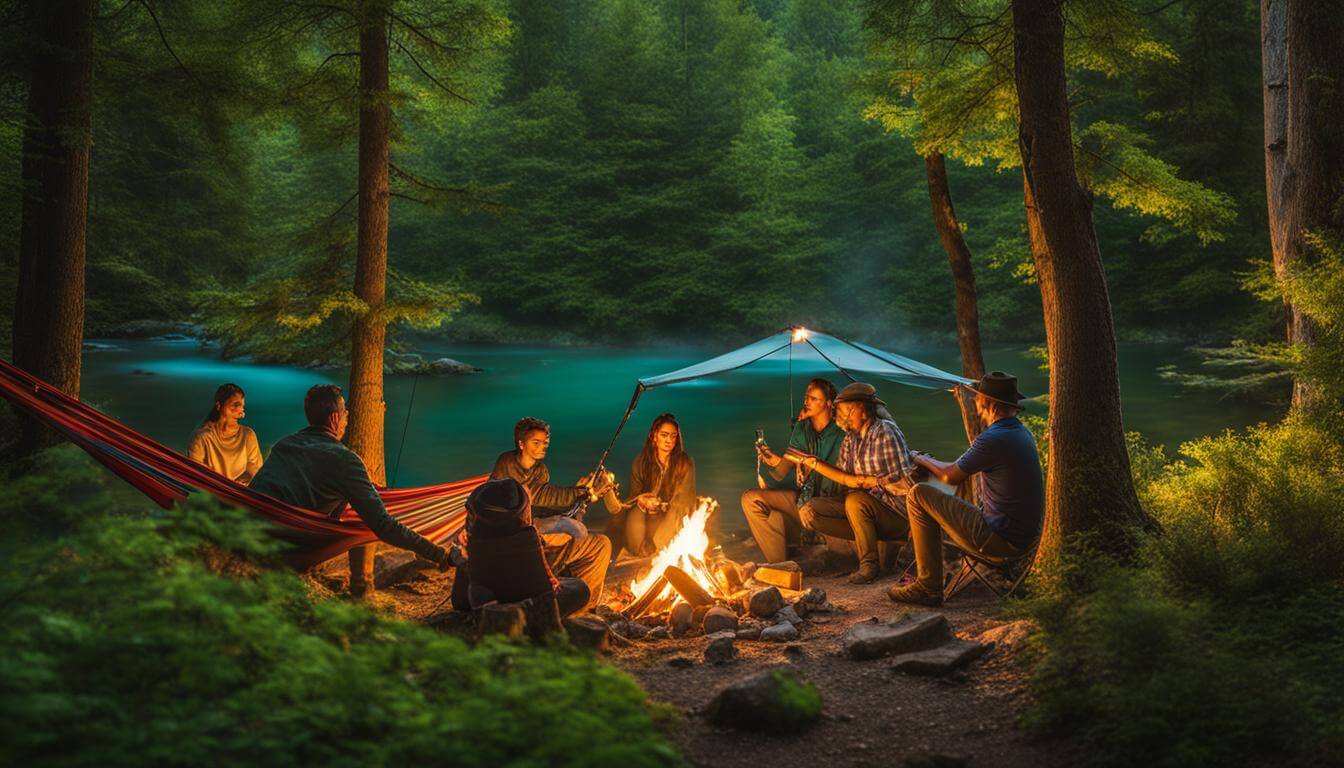Planning a Successful Family Camping Trip

Planning a family camping trip requires careful consideration and preparation. Choosing the right campsite, packing essential camping gear, and planning activities and meals are crucial to ensuring a successful and enjoyable experience for the whole family.

Key Takeaways:
- Choosing the right campsite is essential for a successful family camping trip.
- Pack essential camping gear such as tents, sleeping bags, and cooking utensils.
- Proper meal planning and involving children in cooking can enhance the camping experience.
- Ensure safety by having a first aid kit and following campfire safety guidelines.
- Plan fun activities and create lasting memories by personalising the camping experience.
Selecting the Perfect Campsite
When planning a family camping trip, selecting the perfect campsite is one of the most important decisions you must make. The right campsite can significantly impact the overall experience for your family. Here are some key factors to consider when choosing a campsite:
Novice campers may prefer an established campground at a state or national park, while more adventurous campers may opt for a remote location.
If your family enjoys exploring nearby towns or hiking, select a campground closer to your desired activities.
Ensure the campsite offers basic amenities like running water and flushing toilets for those who prefer a less rugged camping experience.
Make reservations in advance, as popular campgrounds often book up quickly.
To help you visualise the differences, here's a comparison table:
| Established Campground | Remote Location |
|---|---|
| Located in state or national park | Secluded and away from crowds |
| Easy access to amenities and services | Immersive wilderness experience |
| Typically has running water and flushing toilets | May have limited or no amenities |
| Offers a range of recreational activities | Opportunities for off-grid exploration |
By considering these factors and understanding your family's preferences, you'll be able to find a campsite that suits everyone's needs. Remember to check the availability and make early reservations to secure your spot at your campground.
Essential Camping Gear for Families
Proper camping gear is essential for a successful family trip. When packing for your outdoor adventure, make sure to include the following items:
- Well-stocked first aid kit
- Tent with a rain fly and ground cloth
- Sleeping bags suitable for the temperature
- Camping mattresses or foam pads for added comfort
- Lightweight rain gear, such as ponchos
- Flashlights with extra batteries
- Camping stove and fuel
- Camping lantern and fuel
- Camping cook set, including can openers
- Water carriers for easy access to clean drinking water
- Waterproof containers for storing food and supplies
- Sunscreen to protect your skin from harmful UV rays
- Insect repellent to ward off bugs and mosquitoes
- Camping cooler to keep perishable food items fresh
Ensure your camping gear is organised and stored in labelled bins for easy accessibility. Being well-prepared with the right equipment will allow you and your family to enjoy your camping experience fully.
| Item | Description |
|---|---|
| Tent | A sturdy and waterproof shelter for your family to sleep in. |
| Sleeping Bags | Warm and comfortable sleeping bags suitable for the temperature conditions. |
| Camping Mattresses | Additional padding for a more comfortable sleep. |
| Rain Gear | Ponchos or waterproof jackets and pants to stay dry during wet weather. |
| Flashlights | Provide reliable illumination during the night. |
| Camping Stove | A portable stove for cooking meals outdoors. |
| Camping Lantern | Offers ambient light for your campsite in the evening. |
| Water Carriers | Containers for storing and transporting clean drinking water. |
| Sunscreen | Protects the skin from harmful UV rays while outdoors. |
| Insect Repellent | Keeps bugs and mosquitoes away, providing a more pleasant camping experience. |
| Camping Cooler | Keeps perishable food items cool and fresh. |
Remember to pack all the necessary camping gear to ensure a comfortable and enjoyable trip for your family. With the right equipment, you can embrace the great outdoors with confidence.
Quote:
"Having the right camping gear is like having a reliable companion on your outdoor adventure." - Unknown
Staying Dry and Comfortable
Keeping dry while Camping is crucial for a comfortable and enjoyable experience. Here are some tips to help you stay dry and comfortable throughout your camping trip:
1. Tarp under the tent
Place a tarp underneath your tent before setting it up. This extra layer of protection will help prevent rainwater from seeping through the floor and keeping you dry.
2. Seam-sealed tent
Ensure that your tent has been properly seam-sealed. Seam sealing involves applying a special sealant to the tent's seams to make it more waterproof. This will help to keep you dry even during heavy rainfall.
3. Preventing condensation
Condensation inside the tent can make you feel damp and uncomfortable. Avoid placing your sleeping bags directly against the tent walls to minimise condensation. Instead, create space between the sleeping bags and the walls for better airflow.
4. Rain fly
If rain is expected, make sure to promptly set up the rain fly over your tent. The rain fly is an additional waterproof covering that goes over the top of your tent. It acts as a barrier against rain and helps keep your tent inside dry. To reduce condensation, leave a few windows open at the top to allow for ventilation.
Meal Planning for Camping
Proper meal planning is crucial to keep everyone well-fed and happy during a family camping trip. When packing food for your camping adventure, consider the preferences of your children and include a variety of snacks to keep them satisfied throughout the day.
- Pack snacks such as crackers, granola bars, and carrot and celery sticks. These are tasty and provide a good energy source for outdoor activities.
- Involve your children in the cooking process by allowing them to help prepare meals using the camp stove or campfire. Not only does this create a sense of togetherness, but it also teaches them valuable cooking skills.
Hydration is essential when spending time outdoors, so make sure to bring plenty of water. Water bottles, canteens, and water jugs are all practical options to ensure everyone stays hydrated throughout the camping trip.
Plan and pack meals in advance to save time and ensure you have all the necessary ingredients and cooking utensils. This will help avoid any last-minute stress and allow you to focus on enjoying the camping experience with your family.
Safety Tips for Camping with Kids
Safety is of utmost importance when camping with kids. Ensuring their well-being and minimising potential risks should be a top priority. Here are some essential camping safety tips to keep in mind:
1. Prepare a Well-Stocked First Aid Kit
One of the most important camping essentials is a well-stocked first aid kit. This kit should include all the necessary items to handle common injuries or emergencies that may occur while camping, such as bandages, antiseptic ointments, pain relievers, insect repellent, and any necessary medications for pre-existing conditions.
2. Follow Proper Campfire Safety Guidelines
Campfires are a camping tradition, but it's crucial to adhere to campfire safety guidelines. Keep a safe distance between tents and campfires to prevent accidents, especially with curious children. Supervise children closely when they are near the fire and ensure they understand the importance of fire safety.
3. Always Supervise Children
Children should always be supervised to prevent accidents and ensure their safety while Camping. Outdoor environments present various risks, such as uneven terrains, wild animals, and bodies of water. Keeping a watchful eye on children allows immediate intervention and minimises potential dangers.
4. Check for Pet Restrictions
If you plan to bring your furry friends along on your camping trip, make sure to check for any pet restrictions at your chosen campsite. Some campsites might have specific rules regarding pets, such as leash requirements, designated areas, or even pet restrictions altogether. Doing your research beforehand will help you avoid any disappointments or complications.
Camping Games and Activities for Children
Keeping children entertained during a camping trip is essential for a successful and enjoyable experience. As a parent or guardian, I know how important it is to plan fun and engaging camping games and outdoor activities suitable for their age and interests. Encouraging unstructured playtime allows children to explore and have fun outdoors, fostering their creativity and imagination.
“ Play is often talked about as a relief from serious learning. But for children, play is serious learning. Play is the work of childhood.” - Fred Rogers
One of my favorite camping games for children is a classic scavenger hunt. Create a list of items for them to find in nature, such as pinecones, wildflowers, or different types of leaves. This game not only keeps them entertained but also encourages them to explore and learn about their surroundings.

Water-based activities like swimming or fishing can be great outdoor options if the weather permits. Remember to bring appropriate safety equipment and supervise children during these activities.
Hiking is another fantastic activity that allows children to connect with nature while also getting some exercise. Choose a trail suitable for their age and abilities, and don't forget to pack snacks and water to energise them along the way.
Popular Camping Games and Activities for Children
| Game/Activity | Description |
|---|---|
| Nature Scavenger Hunt | A game where children search for specific items in nature, helping them explore and learn about their environment. |
| Water-based Activities | Swimming or fishing can be enjoyable and refreshing activities for children, promoting an appreciation for water and nature. |
| Hiking | Exploring trails and observing wildlife while getting exercise and connecting with nature. |
| Campfire Storytelling | Gather around the campfire and take turns telling spooky or imaginative stories, making memories and encouraging creativity. |
| Stargazing | Admire the night sky and learn about constellations, sparking curiosity and wonder. |
Campfire storytelling is a favourite among children, igniting their imaginations as they share spooky or imaginative stories. This activity fosters creativity and creates lasting memories for the entire family.
Lastly, encourage your little ones to marvel at the night sky and learn about constellations through stargazing. This activity not only sparks curiosity but also cultivates a sense of wonder about the universe we live in.
Remember, bringing games, toys, and sports equipment is important to keep children engaged and entertained throughout the camping trip. By offering a variety of activities, you can ensure that your children have a memorable and enjoyable camping experience.
Sharing Responsibilities and Creating Memories
When it comes to Camping as a family, sharing responsibilities is not only practical but also cultivates a sense of teamwork and togetherness. Involve everyone in the camping experience, and cry for memorable moments and lasting memories. To ensure that everyone plays their part, consider making a duty roster that assigns tasks to each family member. This way, cooking, cleaning, gathering firewood, and hauling water become shared responsibilities.
Avoid overplanning and allow for unstructured time and fun. Sometimes, the most cherished memories are made in those spontaneous moments when we enjoy each other's company and the beauty of the great outdoors. Encourage your family to embrace unstructured play and find joy in the simple pleasures of Camping.
For families with pets, bringing your furry friend along can enhance the camping experience. However, checking in advance if pets are allowed at your chosen campsite is essential. Some campsites have specific pet restrictions or requirements, such as leash regulations or designated pet-friendly areas. Ensure you adhere to these guidelines to make the experience enjoyable for everyone.
"Camping is not just a fun outdoor activity; it is an opportunity to foster a love for nature within your family. By sharing responsibilities, embracing unstructured play, and considering your family pet, you create an environment where lasting memories are made, and outdoor love is cultivated."
Personalizing the Camping Experience
When it comes to family camping trips, personalising the experience is key to creating memories that cater to everyone's individual preferences. By balancing structured activities and unstructured playtime, you can ensure a flexible and enjoyable adventure for the whole family.
Consider each family member's unique needs and desires when planning the itinerary and activities. This allows everyone to engage in activities they genuinely enjoy and feel a sense of ownership over the camping experience.
When planning unstructured playtime, encourage children to explore the natural surroundings, engage in imaginative play, and connect with the outdoors. Unstructured play offers them the freedom to follow their interests and fosters their love for nature.
Remember to include downtime and relaxation in your camping schedule. This allows you and your family to recharge, appreciate the tranquillity of nature, and enjoy each other's company.
Personalization Tips:
- Discuss preferences with each family member to gather ideas for activities and destinations
- Create a flexible itinerary that accommodates individual interests and allows for spontaneous adventures
- Encourage children to choose activities they are passionate about and involve them in the planning process
- Consider the age and abilities of each family member when selecting activities
Benefits of Balancing Structure and Free Time:
Integrating structured activities and free time provides numerous benefits for the whole family. Structured activities allow you to explore new areas, learn new skills, and create shared experiences. On the other hand, unstructured playtime encourages creativity, independence, and a deeper connection with nature.
This balance helps prevent burnout, maintains flexibility, and ensures everyone can engage in activities they enjoy. It also fosters a sense of harmony and togetherness as each family member's preferences are acknowledged and accommodated.
"The beauty of Camping is that it offers something for everyone. By personalising the experience, we create lasting memories that cater to each family member's unique preferences and interests."
Add personalisation to your camping checklist and unlock the full potential of your family camping trips. Embrace the diverse interests within the family, strike a balance between structure and free time, and savour every moment of your outdoor adventures.

Conclusion
Planning a successful family camping trip requires careful consideration and preparation. By selecting the right campsite, packing essential gear, planning meals and activities, and sharing responsibilities, you can ensure a memorable and enjoyable experience for the whole family.
When choosing a campsite, consider the abilities and interests of your camping party. Whether you opt for a family-friendly campground or a remote location, ensure basic amenities like running water and flushing toilets are available. Don't forget to make reservations in advance to secure your spot.
Pack essential camping gear such as a tent, sleeping bags suitable for the temperature, cooking equipment, rain gear, and insect repellent. Staying dry and comfortable is vital, so remember to place a tarp under the tent, seal the tent seams, and set up the rain fly if rain is expected.
Meal planning is crucial to keep everyone well-fed and hydrated. Involve your children in cooking, and pack plenty of food and snacks they enjoy. Safety should always be a priority, so ensure you have a well-stocked first aid kit and follow campfire safety guidelines.
Finally, personalize the camping experience to suit individual preferences and create lasting memories. Balance structured activities with unstructured playtime, allowing for downtime and relaxation. By following these tips, you'll be well-prepared for various weather conditions and can enjoy a successful family camping trip filled with adventure and fun.
FAQ
How can I select the perfect campsite for my family camping trip?
Consider the abilities and interests of your camping party when choosing a campsite. Novice campers may prefer an established campground at a state or national park, while more adventurous campers may opt for a remote location. If your family enjoys exploring nearby towns or hiking, select a campground closer to your desired activities. Ensure the campsite offers basic amenities like running water and flushing toilets for those who prefer a less rugged camping experience. Make reservations in advance, as popular campgrounds often book up quickly.
What camping gear is essential for a family camping trip?
Essential camping gear for families includes a well-stocked first aid kit, a tent with a rain fly and ground cloth, sleeping bags suitable for the temperature, camping mattresses or foam pads for added comfort, rain gear such as lightweight ponchos, flashlights with extra batteries, a camping stove and fuel, a camping lantern and fuel, a camping cook set including can openers, water carriers, waterproof containers, sunscreen, insect repellent, and a camping cooler to store perishable food items. Organise and store your camping gear in labelled storage bins for easy accessibility.
How can I stay dry and comfortable while camping?
To stay dry, place a tarp underneath your tent to prevent rainwater from seeping through the floor. Ensure your tent has been seam-sealed to make it more waterproof. Never place sleeping bags away from the tent walls to avoid condensation. If rain is expected, promptly set up the rain fly over the tent and leave a couple of windows slightly open at the top to minimise condensation.
How can I plan meals for a family camping trip?
Proper meal planning is crucial to keep everyone well-fed and happy during a family camping trip. Pack plenty of food your children enjoy, including crackers, granola bars, carrots, and celery sticks. Involve children in the cooking process by allowing them to help with camp stove or campfire cooking. Stay hydrated by bringing water bottles, canteens, and water jugs. Plan and pack meals in advance, ensuring you have all the necessary ingredients and cooking utensils.
What safety tips should I follow when camping with kids?
Safety is of utmost importance when camping with kids. Ensure you have a well-stocked first aid kit in case of any injuries or emergencies. Follow proper campfire safety guidelines and keep a safe distance between tents and campfires. Supervise children at all times to prevent accidents. Check if pets are permitted at your chosen campsite to avoid restrictions or disappointments.
How can I entertain children during a family camping trip?
Plan camping games and outdoor activities suitable for their age and interests. Allow for unstructured playtime so children can explore and have fun in the great outdoors. Along with games, toys, and sports equipment to keep children entertained.
How can I share responsibilities and create lasting memories during a family camping trip?
Encourage the family to share responsibilities and contribute to the camping experience. Create a duty roster that assigns tasks to each family member, such as cooking, cleaning, gathering firewood, or hauling water. This promotes a sense of teamwork and ensures everyone plays their part. Avoid overplanning and allow for unstructured time and fun. Consider bringing the family pet, but check in advance if they are allowed at your chosen campsite.
How can I personalise the camping experience for my family?
Personalize your family camping experience based on individual preferences and interests. Balancing structured activities with unstructured playtime provides a more enjoyable and flexible experience. Consider each family member's unique needs and desires and adjust the itinerary and activities accordingly. Allow for downtime and natural relaxation to create lasting memories and foster a love for the outdoors.
What are some tips for a successful family camping trip?
Planning a successful family camping trip requires careful consideration and preparation. By selecting the right campsite, packing essential gear, planning meals and activities, and sharing responsibilities, you can ensure a memorable and enjoyable experience for the whole family. Follow these tips, be prepared for various weather conditions, and create lasting memories in the great outdoors.
